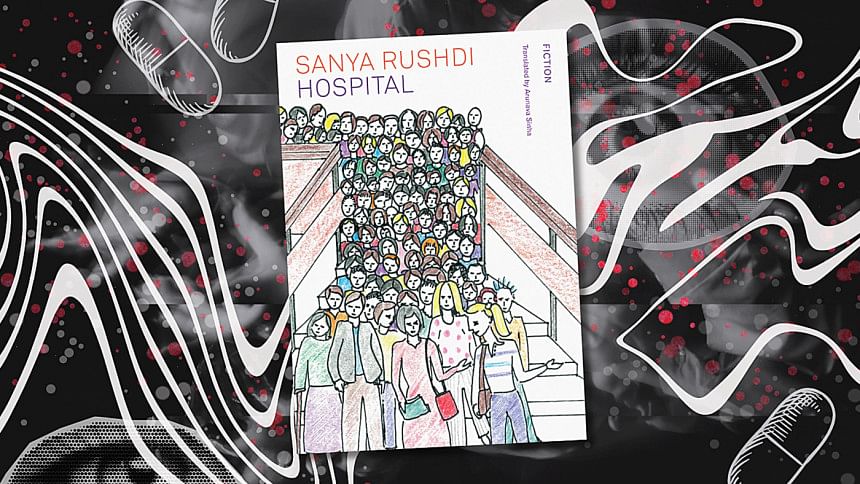Meditations on sanity in ‘Hospital’

Though on its surface Sanya Rushdi's Hospital, translated into English by Arunava Sinha and recently longlisted for the 2024 Stella Prize, looks to be a breezy, short read—it is anything but. With her rather flattened, sparse prose, Rushdi has managed to write an enduring piece of autofiction, a compelling account of psychosis that neither sensationalises nor withers away any sentimentality from the struggles of mental health.
Hospital, originally published in 2019 in Bangla by Bohiprokash, is Sanya Rushdi's debut, and as first novels go, it is a commendable effort. A thoughtful novel, where the narrator's attempts to understand her condition (and the world around her) is skillfully pitted against the maze-like complexities of her illness. The Sanya in the novel had been working toward a PhD in developmental psychology before a bout of psychosis put a stop to it. "I was half done", she says, "I'd just got through the confirmation-of-candidatures stage. I was about to start my research after getting approval from the ethics committee when the illness struck." Yet, over the course of the book, we see her often making trips to the library to study on her own. Her account of events is often patchy, full of erasures that strengthen the anxieties documented in the novel. It results in a slippery prose that whisks the reader to surprising falls of shock, dismay, and surprise. Rushdi's language in itself is violent in a way, which is perhaps fitting for a novel that wishes to show the violence of an individual surrendering her agency to the institution. We see one of the doctors maniacally howling out "Lithium! Lithium! Lithium!" when Sanya tries to reason with him.
In the actions of Sanya's family, particularly when her father reads the Quran to calm her, there are traces of Bangali mannerisms, a potent silhouette of the original behind an English version that masterfully stands on its own.
Often the discomfort is brought on by the very people who are supposed to help Sanya. The man in uniform in the library's security office, to whom Sanya tells of her plight, wheedles her into getting on an ambulance and deserts her in the waiting room outside the Emergency. When she tires of waiting and returns home, she finds cops over her house to take her away, "Give your mother and sisters hugs", they command. One understands the unreliability of Sanya's version of events, but the author's adept use of ambiguity here makes for surreal reading.
Arunava Sinha, in his part as translator, has retained all the suspense that an overthinking patient such as Sanya would bring to the reader. In the actions of Sanya's family, particularly when her father reads the Quran to calm her, there are traces of Bangali mannerisms, a potent silhouette of the original behind an English version that masterfully stands on its own.
All talk of Sanya's condition aside, Rushdi's novel is at heart a story of loneliness. During her spell in the hospital, we see Sanya smitten with another patient, Ivan, who in a hurry wears his jeans inside out. Sanya sees the label "Made in Bangladesh" and wonders: "Did he know everything all along, that something would develop between us?" Early on in the book, Sanya uses this same jarring line of reasoning to believe a boy on Facebook had been sending her cryptic signals through his own posts. Sanya explains it to a doctor: "When we talk to each other, the tone we use, the words we choose, the grace with which we express ourselves, all point to something different. A meaning that is not directly contained in what we say". Ivan is later seen with jeans labelled "Made in China"—an insignificant detail in the grand scheme of things, but affectingly tragic from Sanya's point of view. There is a sense of aloneness which permeates throughout the book. Even the love and care of a family tastes saccharine in this light.
In Sanya's world, where every interaction is scrutinised, any deviation of thought is treated with suspicion, and friendships are forged to administer medication easily, it does not ultimately matter how quickly one recovers and returns from the institution. As we see in Sanya's case, home too can easily become cold and clinical with only a coating of warmth on the surface, just like hospitals.
Shahriar Shaams has written for Dhaka Tribune, The Business Standard, and The Daily Star. He is nonfiction editor at Clinch, a martial-arts themed literary journal. Find him on twitter @shahriarshaams.

 For all latest news, follow The Daily Star's Google News channel.
For all latest news, follow The Daily Star's Google News channel. 








Comments